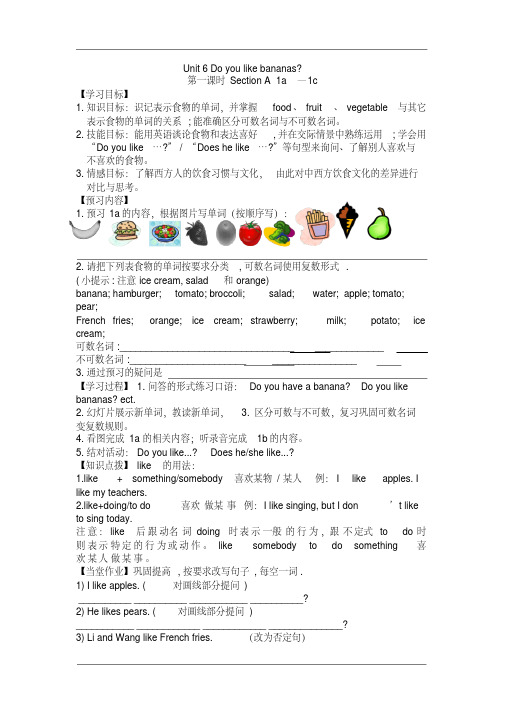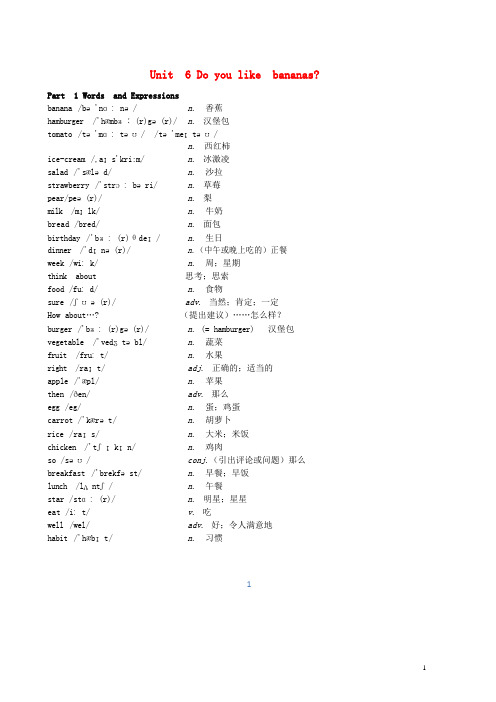新目标版(Go for it)2019-2020学年初中英语七年级上册Unit 6 Do you like bananas_ 单元练习B卷
新目标英语七年级上册Unit6_Do_you_like_bananas课标解析

新目标英语七年级上册Unit6 Do you like bananas?课标解析
许晏菱初2014级
教材分析
本单元的主题是教会学生在日常生活中养成健康饮食的习惯。
整个单元以食物名词为主题,以一般现在时的like进行对话为途径,从听说读写等方面开展学习任务。
语法的重点是行为动词的一般现在时。
由于课文以对话展现,学生很容易地把生活中的情景和书上的对话以及文段比较自然地联合起来。
本单元的中心话题是Food,主要语言功能项目是Talk about likes and dislikes.当主语是第三人称单数时句型的变化以及回答是本单元的语法重点。
在第五单元学生已经对do and does 有了一定的认识。
本单元主要句型:Do you like…? 及其回答Yes, I do. / No, I don’t.学生就容易理解。
综上所述,本单元以食物为主线,围绕着谈论喜欢与不喜欢以及一日三餐等语言功能项目展开了一系列任务活动。
要求学生能够用英语写一篇介绍自己家人喜欢和不喜欢的食物,养成健康饮食的习惯。
单元教学安排
本单元分为5个课时,分别是sectionA两课时,sectionB两课时,一课时阅读课。
单元目标
课时目标
思想情感目标:
1)通过学习文章,学会养成健康饮食的习惯。
2)学习养成节约粮食,爱惜食物的品质。
能力发展目标:
1)能掌握书面表达的基本写法。
2)能正确使用可数名词和不可数名词。
3)能掌握一般现在时的结构、意义和用法。
人教新目标英语七上Unit6Doyoulikebananas教案4

Unit 6 Do you like bananas?第一课时Section A 1a—1c【学习目标】1.知识目标:识记表示食物的单词,并掌握food、 fruit、 vegetable与其它表示食物的单词的关系;能准确区分可数名词与不可数名词。
2.技能目标:能用英语谈论食物和表达喜好,并在交际情景中熟练运用;学会用“Do you like…?” /“Does he like…?”等句型来询问、了解别人喜欢与不喜欢的食物。
3.情感目标:了解西方人的饮食习惯与文化,由此对中西方饮食文化的差异进行对比与思考。
【预习内容】1.预习1a的内容,根据图片写单词(按顺序写):2.请把下列表食物的单词按要求分类,可数名词使用复数形式.(小提示:注意ice cream, salad和orange)banana; hamburger; tomato; broccoli; salad; water; apple; tomato; pear;French fries; orange; ice cream; strawberry; milk; potato; ice cream;可数名词:_________________________________ _____________不可数名词:______________________ ________________3.通过预习的疑问是【学习过程】1.问答的形式练习口语:Do you have a banana? Do you like bananas? ect.2.幻灯片展示新单词,教读新单词,3.区分可数与不可数,复习巩固可数名词变复数规则。
4.看图完成1a的相关内容;听录音完成1b的内容。
5.结对活动:Do you like...? Does he/she like...?【知识点拨】like 的用法:1.like + something/somebody 喜欢某物/某人例:I like apples. I like my teachers.2.like+doing/to do喜欢做某事例:I like singing, but I don’t like to sing today.注意:like后跟动名词doing时表示一般的行为,跟不定式to do时则表示特定的行为或动作。
七年级英语上册 Unit 6 Do you like bananas(第5课时)Section B(2a-3b)课件 (新版)人教新目标版

二、根据句意及汉语提示写单词。
6.Dale's brother _w_a_n__ts_(想要) an apple. 7.My son has good eating _h_a_b_i_t_s (习惯). 8.Fruit and vegetables are __h_e_a_lt_h_y_(健康的) food. 9.You can ask me some __q_u_e_s_ti_o_n_s_(问题). 10.The picture is __r_e_a_ll_y__(真正地) nice.
Unit 6 Do you like bananas?
第五课时 Section B(2a~3b)
1.Sports star eats well.体育明星吃得好。 (1)sports star体育明星。 (2)eats是eat的第三人称单数形式。在一般现在时中,当主语是 第三人称单数,就用动词的第三人称单数形式。 (3)well adv.好,主要用于修饰动词。 2.ask sb. about sth.向某人询问某事 3.her eating habits她的饮食习惯 此处eating作定语。eg: I have good eating habits.我有好的饮食习惯。
4.healthy 形容词,意为“健康的”,其名词形式为health,其反义词为 unhealthy。 5.I don't want to be fat.我不想长胖。 want“要,想要”,常用结构有:want sth.“想要某物”;want to do sth.“想做某事”,want sb. to do sth.“想要某人做某事”。 6.What do you like for breakfast?你早餐喜欢什么? (1)for 介词,意为“为了,给”,在句型“have…for breakfast/lunch/dinner”中表示“某人吃什么。” (2)breakfast前面不能用冠词,一日三餐前一般不加冠词。
人教版2020年七年级英语上册Unit6Doyoulikebananas讲义(新版)人教新目标版

Unit 6 Do you like bananas?Part 1 Words and Expressionsbanana /bə'nɑːnə/ n. 香蕉hamburger /'hæmbɜː(r)gə(r)/ n. 汉堡包tomato /tə'mɑːtəʊ/ /tə'meɪtəʊ/n. 西红柿ice-cream /,aɪs'kri:m/ n. 冰激凌salad /'sæləd/ n. 沙拉strawberry /'strɔːbəri/ n. 草莓pear/peə(r)/ n. 梨milk /mɪlk/ n. 牛奶bread /bred/ n. 面包birthday /'bɜː(r)θdeɪ/ n. 生日dinner /'dɪnə(r)/ n.(中午或晚上吃的)正餐week /wiːk/ n. 周;星期think about 思考;思索food /fuːd/ n. 食物sure /ʃʊə(r)/ adv. 当然;肯定;一定How about…?(提出建议)……怎么样?burger /'bɜː(r)gə(r)/ n. (= hamburger) 汉堡包vegetable /'vedʒtəbl/ n. 蔬菜fruit /fruːt/ n. 水果right /raɪt/ adj. 正确的;适当的apple /'æpl/n. 苹果then /ðen/adv. 那么egg /eg/ n. 蛋;鸡蛋carrot /'kærət/ n. 胡萝卜rice /raɪs/ n. 大米;米饭chicken /'tʃɪkɪn/ n. 鸡肉so /səʊ/ conj.(引出评论或问题)那么breakfast /'brekfəst/ n. 早餐;早饭lunch /lʌntʃ/ n. 午餐star /stɑː(r)/ n. 明星;星星eat /iːt/ v. 吃well /wel/ adv. 好;令人满意地habit /'hæbɪt/ n. 习惯1healthy /'helθi/adj. 健康的really /'riːəli/ adv. 真正地question /'kwestʃən/ n. 问题want /wɒnt/ v. 需要;想要be /biː/ v. 变成fat /fæt/adj. 肥的;肥胖的Part 2:Texts课文(一)Jack: Hey, John’s birthday dinner is next week. Let’s think about the food.Tom: Sure. How about burgers, vegetable salad, and some fruit? Bill: Sounds good. John likes hamburgers.Jack: Oh, I don’t like salad.Bill: But John likes salad, and it’s his birthday.Jack: Yes, you’re right. What about the fruit?Tom: I think John likes strawberries and apples.Jack: OK. Let’s have strawberries and applesthen.Structure——谈论好恶1.Do you like salad? Yes, I do./No, I don’t.2.Do they like pears? Yes, they do./ No, they don’t.3.Does she like tomatoes? Yes, she does./ No, she doesn’t.4.I like oranges. I don’t like bananas.5.We like rice. We don’t like hamburgers.6.He likes ice-cream. He doesn’t like vegetables.重点句型:—Do / Does sb. like…?—Yes, sb. do / does.—No, sb. don’t / doesn’t.sb. like/likes ….sb. don’t/doesn’t like ….Underline the correct words in the brackets.在括号内正确的单词下画线。
新版七年级初一上册第六课英语Unit 6 Do you like bananas

He/ She/ It likes… He / She/ It doesn’t like…
PPT模板下载:/moban/ 节日PPT模板:/jieri/ PPT背景图片:/beijing/ 优秀PPT下载:/xiazai/ Word教程: /word/ 资料下载:/ziliao/ 范文下载:/fanwen/ 教案下载:/jiaoan/
1.---Does Tom like bananas? ---_____, No ____ he _______. doesn’t But Rose does.
likes 2.My mother ______salad. But I don’t like.(like 3.Do you like apples ___________? (apple) doesn’t 4.She _______ like ice cream. 5.They like hamburgers.(一般疑问句) Do they like hamburgers?
lunch Tom’s
Tom’dinner s
Sandra has/likes eggs, apples and bananas for breakfast. Tom has/likes … for lunch.
返回
He has … He doesn’t have… He likes … He doesn’t like…
2. salad是西餐中一道经典的凉拌菜。传统的沙拉是将洗 净、切成块状或片状的生蔬菜(通常包括生菜、黄瓜 和西红柿等)与沙拉酱混合,均匀搅拌即可。沙拉也 有水果沙拉(fruit salad)、土豆沙拉(potato salad)、海鲜沙拉(seafood salad)等各个品种。
Exercises
人教版新目标七年级上册Unit 6 Do you like bananas课件

Fruits
pear banana orange
strawberry
pear banana
orange
strawberr
5
Vegetables
tomato
tomatoes
carrot
carrots
6
s
salad
ice-cream 7
Test: Who has the best eyes? 谁的眼睛最亮?
Tom: I think John likes strawberries and apples. Bill: OK. _L_et_’s_h_a_v_e___ strawberries and apples then.
I'm Eric.
I
ice-cream.
But
salad.
He's Eric. He likes ice-cream . But he doesn't like salad.
B:No, I don't.
3 A:Do you like oranges?
B:Yes, I do.
1 添加文本
A: Do you like bananas?
B: Yes, I do. 添加文本
2b Listen again. Fill in the blanks.
tomatoes
ice cream ice cream
课题:Unit 6 Do you like bananas? 学科:初中英语 版本:人教版七年级上册 ]
学习目标
learning aims
1 To master the names of fruit and other food. 2 To talk about likes and dislikes . 3 To learn to enjoy a healthy life.
新目标英语七年级上册第六单元说课稿
新目标英语七年级上册第六单元说课稿Unit 6 Do you like bananas?(Go for it )说课稿一、教学背景分析(一)教学内容分析本单元的中心话题是Food. 主要语言功能项目是Talk about likes and dislikes. 语法结构为Present tense to like,Yes / No questions and short answers, Affirmative and negative statements. 本单元Section A所表现的是与谈论喜好与厌恶相关的基本语言知识及其初步使用。
这部分内容从表现食物词汇开始,通过视、听等方式输入信息,并引出本单元主要句型:Do you like…?及其回答Yes,I do / No, I don’t.接着设计了一个听力练习,要求圈出所听到的食物以及补全对话,强化记忆所学词汇和初学句型。
然后教材设计了一个结对活动,以此操练主语是第三人称单数时句型的变化以及回答。
并借此突出本单元的语法重点。
最后教材设计的Food Survey起到了引导学生初步综合使用所学语言的作用,以调查的形式使学生在富有挑战性的活动中主动使用所学语言,落实新知。
Section B是在Section A基础上的知识的扩展和延伸。
本单元中,Section B首先以听、说、写的形式展开了食物与名称配对以及对食物实行分类。
接着设计了听力填写Sandra和Tom喜欢与不喜欢的食物;自然引到了谈论一日三餐的话题的结对活动,实现了新旧知识的综合使用;一日三餐合理健康膳食引出同步阅读;之后的写一段话谈谈Tom的一日三餐到写一段关于自己一日三餐喜欢吃的食物,直到最后的小组活动列出购物清单,使学生从完成半真实的任务转向了完成真实的任务,从而达到了创造性活用所学语言的目的。
Self check 部分的主要内容是对本单元主要词汇及语言使用水平的自我评价。
综上所述,本单元以食物为主线,围绕着谈论喜欢与不喜欢以及一日三餐等语言功能项目展开了一系列任务活动。
人教新目标版初中英语七年级上册 Doy ou like bananas Sectin A PPT课件
巩固练习
视野拓展
教学目标
教学过程
巩Hale Waihona Puke 练习视野拓展a hamburger
hamburgers
教学目标
教学过程
巩固练习
视野拓展
French fries
教学目标
教学过程
巩固练习
视野拓展
ice cream
chicken
教学目标
教学过程
巩固练习
视野拓展
salad
教学目标
教学过程
巩固练习
视野拓展
1
A. ice cream
视野拓展
an apple a banana
教学目标
教学过程
巩固练习
视野拓展
a tomato
a strawberry
教学目标
教学过程
巩固练习
视野拓展
apples
tomatoes
教学目标
教学过程
巩固练习
视野拓展
oranges
bananas
教学目标
教学过程
巩固练习
视野拓展
broccol
教学目标
教学过程
教学目标
教学过程
巩固练习
视野拓展
Do you like bananas ?
bananas
No, I don’t. I don’t like bananas.
教学目标
教学过程
巩固练习
视野拓展
Do you like strawberries ?
strawberries
Yes , I do .
I like strawberries.
Do you like…. ? Yes , I do . No , I don’t .
七年级英语Unit 6Do you like bananas 人教版(新目标)知识精讲
初一英语Unit 6 Do you like bananas? 人教版(新目标)【本讲教育信息】一. 教学内容:Unit 6 Do you like bananas?(一)语言目标谈论爱好和厌恶。
(二)语言功能学会用英语表达自己喜欢或不喜欢的东西,询问别人是否喜欢,提出建议。
(三)重点句型Do you like bananas? Yes, I do./No, I don’t.I like French fries. I don’t like tomato es.(四)主题词表(五)重点词汇及短语词汇:like, hamburgers, tomatoes, broccoli, French fries, oranges, ice cream, salad, bananas, eggs, carrots, strawberry, apples, chicken, breakfast, lunch, dinner, fruit, vegetable.短语:a lot of like to do sth. like doing sth.(六)语法1. 动词like的用法。
2. 一般疑问句的肯定、否定回答。
3. 名词复数的使用。
(七)重难点分析:1. 可数名词和不可数名词(1)可数名词:①定义:是可以计数的名词。
②可数名词前可以用a,an限定。
③可数名词前可以用one,two,three…限定。
④可数名词有复数形式。
(2)不可数名词:①定义:指不能计数的名词。
②不可数名词前不可以用a,an限定。
③不可数名词前不可以用one,two,three…限定。
④不可数名词没有复数形式。
2. 一般名词的复数形式(1)一般在名词词尾加-s。
如:banana-bananas(2)以-o,-s,-sh,-ch及-x结尾的名词,在词尾加-es构成复数形式。
如:tomato-tomatoes (3)有些以-o结尾的名词仍加-s。
2020七年级英语上册 Unit 6 Do you like bananas(单词+重点句型)语法解析
Unit 6 Do you like bananas?banana 香蕉hamburger 汉堡包tomato 西红柿ice-cream 冰激凌salad 沙拉strawberry 草莓pear 梨milk 牛奶bread 面包birthday 生日dinner (中午或晚上吃的)正餐week 周;星期think about 思考;思索food 食物不可数sure 当然;肯定;一定How about (提出建议)......怎么样?burger 汉堡包vegetable 蔬菜fruit 水果right 正确的;适当的apple 苹果then 那么egg 蛋;鸡蛋carrot 胡萝卜rice 大米;米饭chicken 鸡肉so (引出评论或问题)那么breakfast 早餐;早饭lunch 午餐star 明星;星星eat 吃well 好;令人满意地habit 习惯healthy 健康的really 真正地question 问题want 需要;想要be 变成fat 肥的;肥胖的1.breakfast n.早餐;早饭(表示一日三餐前的词一般不用冠词)【解析】①吃三餐习惯与动词have 连用,且为零冠词,但与形容词连用时,前面要加不定冠词a/an。
have breakfast 吃早饭have a good breakfast 吃一顿丰盛的早餐have a quick breakfast 早餐吃得很快②at breakfast 吃早餐时【扩展】brunch n.早午餐2. well adv.好;令人满意地【解析】常见搭配:do well in…在……做得好辨析good,fine,well,fine.① good 意为“好的,令人满意的”,常指物品的质量,人的品质等方面的好,也常与morning,evening,afternoon等词搭配表示问候。
Alice is a good girl. 爱丽丝是一个好女孩。
- 1、下载文档前请自行甄别文档内容的完整性,平台不提供额外的编辑、内容补充、找答案等附加服务。
- 2、"仅部分预览"的文档,不可在线预览部分如存在完整性等问题,可反馈申请退款(可完整预览的文档不适用该条件!)。
- 3、如文档侵犯您的权益,请联系客服反馈,我们会尽快为您处理(人工客服工作时间:9:00-18:30)。
第 1 页 共 14 页 新目标版(Go for it)2019-2020学年初中英语七年级上册Unit 6 Do you like bananas_ 单元练习B卷
一、 单选题 (共15题;共30分) 1. (2分)—Dad, it is said that the Chang'e-4 spacecraft landed on the far side of the moon. Could you tell me __________?
—Sorry. Let's search for the information on the Internet.1 A . whether it is the first spacecraft to land on the far side of the moon B . when did the amazing thing happen C . whether the spacecraft had done experiments or not D . how long the spacecraft has landed on the far side of the moon 2. (2分)If a thing is important enough, it's worth ______ well. So go out of your way to study for the coming challenge.
A . being done B . doing C . to do 3. (2分)__________ like eating candy. A . Child B . Childs C . Children D . Childrens 4. (2分)(2015.山东济宁)If you need to go to the restroom in class, please your hand.
A . raise B . rise C . shake D . wash 5. (2分)All the information except these two pieces _____ writing the article. A . have been used to B . has been used to C . have been used for 第 2 页 共 14 页
D . has been used for 6. (2分)Look! There ________ lots of sheep and pigs on the hill. A . was B . were C . is D . are 7. (2分)Does her sister _________ your name? A . know B . knows C . to know D . knowing 8. (2分)— are these people buying? —Train tickets. A . Where B . How C . Who D . what 9. (2分)— _______Tom in the library? — Yes. His friends Eric and Dale _______ in the library, too. A . Is; are B . Is; is C . Are; is D . Are; are 10. (2分)—Do you like listening to country music or rock music? —________. It brings me pleasure. A . Yes, I do B . No, I don't C . I like music D . Country music 第 3 页 共 14 页
11. (2分)In most homes, people cook meals in the _________. A . living room B . kitchen C . bedroom D . balcony 12. (2分)——Would you mind my opening the window? ——___________ It's much too hot here. A . Certainly. B . Of course not. C . All right. D . Yes, you can. 13. (2分)________________ buy your ticket from a ticket machine. There are lots of people there. A . Not B . Not to C . Don't D . Don't to 14. (2分)—_____ do you go to the zoo with your sister? —Three times a month. A . How long B . How much C . How old D . How often 15. (2分)Computers may be ______________ than judges and teachers ______________ doing their jobs.
A . better; in B . worse; in C . better; at D . poorer; at 二、 完形填空 (共1题;共15分) 第 4 页 共 14 页
16. (15分)通过下列短文,掌握其大意,然后从短文后各题所给出的四个选项中选择最佳的一项,并将答题卡内相应的字母标号涂黑。
Is your schoolbag too heavy? The e-schoolbag will help you. It is said1 e-schoolbags are going to be brought into 2 in Chinese middle schools soon.
Heavy schoolbags have been a serious 3for a long time. But the e-schoolbag will4. 5 e-schoolbag is 6 lighter than a usual schoolbag. Perhaps, the e-schoolbag should be7an e-textbook. It is a small computer for students. It is as8 as a usual book, 9 it can still have all the things for study,10textbooks, exercise books and so on which can be made 11 chips(芯片) like stamps. The students can read the text page by page on the screen, 12 notes, or even send e-mails to their teachers. They only need to 13 the right chip into the e-schoolbag. Then they can use it.
Some people say 14 e-textbooks can be15broken, while others say it is not good for eyes. But only time will tell.
(1) A . what B . that C . which D . whose (2) A . use B . useful C . used D . to use (3) A . idea B . problem C . question D . thought (4) A . work it out B . work out it C . work out D . work them out 第 5 页 共 14 页
(5) A . An B . The C . / D . A (6) A . very B . much C . too D . so (7) A . call B . calls C . called D . calling (8) A . small B . smaller C . smallest D . most small (9) A . and B . as C . or D . but (10) A . example B . such as C . such like 第 6 页 共 14 页
D . for example (11) A . into B . from C . up D . of (12) A . take B . make C . to take D . to make (13) A . bring B . get C . take D . put (14) A . if B . what C . that D . which (15) A . easy B . easily C . most easily D . easier 三、 阅读理解 (共2题;共18分) 17. (8分)阅读下列短文,从下面每小题的A、B、C、D四个选项中选出最佳选项。 Eric didn't know he was going to help a blue whale today. As soon as he finished his homework,
